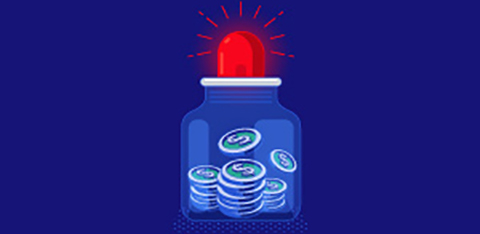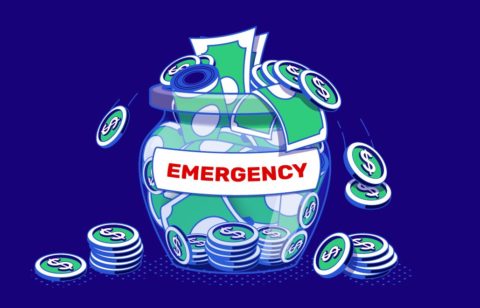Setting up an emergency fund to cover things such as unexpected car repairs, hospital bills, or job loss is important to your financial future. Without an emergency fund as a financial backup, when your car breaks down and requires an expensive repair, you’ll turn to a credit card and increase your debt. Perhaps it wouldn’t take you that long to pay off a $500 credit card balance, but suppose the repairs were well over $1,000. Suppose you lost your job, and it took you three months to find a new one. Imagine if an unexpected trip to the emergency room left you with a huge hospital bill. These are the reasons why you need an emergency fund.
An Emergency Fund Defined
An emergency fund is just as the name states. It’s a fund to be used for emergencies. It’s recommended that you have six to nine months worth of expenses (bills and discretionary spending) saved in an account that’s dedicated to your emergency savings. Keeping it in an account that’s separate from your checking or other accounts will prevent you from spending any of it.
Six Ways Your Emergency Fund Will Help You
Having an emergency fund gives you security if something terrible happens. However, it has other benefits that you might not have considered.
1. Eliminates the Need for Credit
The main goal of an emergency fund is to keep you from using credit cards in an emergency.
2. Keeps You Afloat after a Job Loss
Even if you think your job is 100% secure, it isn’t. You can never know for sure. You may not find a new job right away, and using credit to support your family isn’t a smart financial solution. With emergency cash set aside, you can concentrate on finding a new job.
3. Removes Hesitation When It Comes to Medical Treatments
Many people forego medical treatments because of their expense, even if their health will deteriorate. With your emergency fund to help, you won’t have to make a difficult decision about your health or that of a loved one.
4. Prevents the Urge to Borrow from Your 401(k)
Borrowing from your retirement should be a last resort. Sure, it’s your money, and the interest is paid back to you. However, while you’re paying it back, the money you borrowed isn’t earning anything, and if you lose or leave your job, you only have 60 days to pay back the loan in full. Your retirement money should stay in your retirement account where it can continue to grow.
5. Helps Void Financial Arguments
Most relationship arguments stem from financial problems. If you find yourself in an emergency such as a job loss, your backup fund will alleviate some of the stress on your relationship.
6. Relieves Financial Stress
That frightened little voice in your head that says, “What if I get sick?” or “What if I lose my job?” will be silenced. You’ll get peace of mind knowing that you have it covered.
How Much Will You Need?
There’s no crystal ball to show when you’ll need to tap into your emergency fund or how much money you’ll need. According to the Bureau of Labor Statistics, the average duration for unemployment for July 2019 was 19.6 weeks; thus, you could find yourself out of work for months. Alternatively, you may have to settle for a job that pays a considerable amount less than your previous one.
To get an estimate of how much you may need for an emergency fund, compile a list of all your current monthly bills, including mortgage or rent, utilities, phone, credit cards, and loans, as well as discretionary spending such as clothing, eating out, and entertainment. Be sure to include any yearly bills such as taxes or insurance, and the amount that you may spend during the holidays. The goal of the emergency fund is to support yourself while you’re going through a tough financial period, and if you can build up your emergency fund, you won’t have to cancel Christmas. However, if you’re relying on your emergency fund, you’ll presumably be cutting back on some of your discretionary spending, which means you may be able to stretch your fund further.
Multiply the total of your monthly bills and your discretionary spending by six or nine months, and you’ll have a good idea how much you should have put away in your fund. Achieving this amount of savings may seem daunting, but it doesn’t have to happen overnight. Look at your total monthly expenses and subtract that from your take-home pay. This should show you how much money you have left over each month to work with. Decide what’s an affordable amount to put away. You shouldn’t be putting away so much that you find yourself short at the end of the month and have to use your credit card or use your emergency fund money.
Slow and steady wins the race. If you’re consistent with your savings, over time, you’ll have built up a suitable emergency fund to cushion you and your family if you ever need it.





